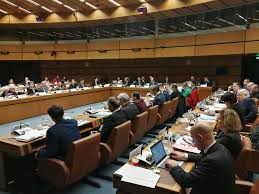- Courses
- GS Full Course 1 Year
- GS Full Course 2 Year
- GS Full Course 3 Year
- GS Full Course Till Selection
- CSAT
- 5 LAYERED ARJUNA Mentorship
- Public Administration Optional
- Online Program
- GS Recorded Course
- NCERT Batch
- Polity Module Course
- Geography Module Course
- Economy Module Course
- AMAC Module Course
- Modern India, Post Independence & World History Module Course
- Environment Module Course
- Governance Module Course
- Science & Tech. Module Course
- International Relations and Internal Security Module Course
- Disaster Management Module Course
- Ethics Module Course
- Essay Module Course
- Current Affairs Module Course
- ABOUT US
- OUR TOPPERS
- TEST SERIES
- FREE STUDY MATERIAL
- VIDEOS
- CONTACT US
UNODC Report on Expansion of Organized Crime Groups
UNODC Report on Expansion of Organized Crime Groups
25-04-2025

The United Nations Office on Drugs and Crime (UNODC) has released a report highlighting the spread of transnational organized cybercrime groups beyond East and Southeast Asia due to increased crackdowns in the region.
Changing Trends and Highlights from the UNODC Report:
- Transnational Organized Crime in Southeast Asia: For example, Myanmar has seen a shift to synthetic drug production, particularly methamphetamine.
- Geographical Expansion: These crime groups have expanded from East and Southeast Asia to Africa, South Asia (including India), the Middle East, Pacific islands, Europe, North America, and South America.
- In March 2025, large numbers of Indian nationals were repatriated from scam centers in Myawaddy, Myanmar.
- Emergence of New Illicit Online Marketplaces: The Huione Guarantee (Haowang), a telegram-based marketplace, has become one of the largest illicit online platforms in Southeast Asia.
Cyber Fraud and Organized Criminal Groups (OCGs):
- Engagement in Cybercrime: Organized crime groups (OCGs) have increasingly used Information and Communication Technology (ICT) to exploit new online criminal markets, such as internet gambling.
- Professionalization of OCGs: These groups have become more sophisticated, utilizing malware, deepfake technology, and other AI-driven tools to conduct cybercrime activities.
Recommendations for Addressing the Issue:
- Raise political awareness and will to combat cybercrime.
- Strengthen regulatory frameworks and enhance the operational capacity of enforcement agencies.
- Improve regional cooperation to better address cross-border organized crime.
Related News: NITI Aayog’s ‘Digital Arrest’ Article
NITI Aayog recently published an article titled "Digital Arrest: The Modern-Day Cyber Scam," which explains the growing threat of cybercrime.
What is Digital Arrest?
Digital Arrest: A scam technique where fraudsters impersonate law enforcement officials, threatening victims with arrest, frozen bank accounts, or passport cancellations to extort money under the guise of a "fine" or "security deposit."
Why Does It Happen?
- Human Psychology and Social Engineering: Criminals exploit emotions like fear, excitement, or urgency to manipulate victims.
- Weak Cybersecurity Practices: Poor password management and weak credentials contribute to vulnerabilities.
- Evolving Cybercrime Techniques: Cybercriminals adapt quickly to bypass security measures.
- Digital Payments and Financial Fraud: Risks include fake UPI requests and QR code scams.
- Dark Web and Cybercrime Networks: Criminals trade stolen data and illegal services on the dark web.
- Weak Cyber Laws and Enforcement: The lack of strong legal frameworks and enforcement measures enables cybercrime.



